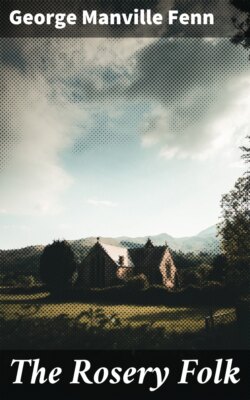Читать книгу The Rosery Folk - George Manville Fenn - Страница 6
На сайте Литреса книга снята с продажи.
Fanny’s Magazines.
Оглавление“Have you brought my magazines, William?” said a bright-faced, eager girl, with no slight pretensions to good looks, as she stood there in her neat, dark, closely fitting dress with white apron, collar and cuffs, and natty muslin cap with black ribbon, looking the very model of the neat-handed Phyllis many people think so satisfactory for a parlour-maid. The William addressed was a broad-shouldered, heavy-looking young man of three or four and thirty, dressed in brown velveteen coat and vest, and drab cord trousers. He was very cleanly shaved; his fair crisp hair closely cut; and he had evidently been paying a great deal of attention to his heavy boots. There was a sprig of southernwood in his button-hole, a smaller sprig in his mouth; and he held in one hand his soft felt hat, in the other, one of those ash, quarter-staff-looking implements, with a tiny spade at the end, known to farmers as a thistle-spud—a companion that served him as walking-stick and a means of getting rid of the obnoxious weeds about his little farm. For Brother William, otherwise William Cressy, farmed the twenty acres that had been held by his ancestors for the past two hundred years, and it was his custom to walk over every Saturday to see how his sister Fanny was getting on, the said young lady having been in service at the Rosery ever since Sir James Scarlett’s marriage, he always timed his visit so that he should get there just before Martha set out the tea-things, and from regular usage Martha always placed an extra cup—extra large as well, for Brother William, who afterwards stayed until supper, and then declared, in a tone quite of remonstrance, “Well, I must go now,” as if he had been all along pressed to stay, whereas he had scarcely spoken all the time, and been hardly spoken to, but had sat stolidly in an armed Windsor chair staring at Martha, the housemaid, as she darned, stockings, a whole basket full, with the light making a broad path upon her carefully smoothed and glossy hair.
“Yes; here they be,” said Brother William, solemnly drawing a couple of the most romantic and highly flavoured of the penny weeklies of the day from his breast-pocket, and opening and smoothing them out, so as to display to the best advantage the woodcuts on the front pages of each, where, remarkably similar in style, a very undulatory young lady in evening dress was listening to the attentions of a small-headed, square-shouldered gentleman of impossible height, with an enormous moustache, worn probably to make up for his paucity of cranial hair. “Yes; here they be; and I don’t think much of ’em either.”
“No! what do you know about them?” said the girl sharply. “If it had been the Farmer’s Friend, with its rubbish about crops and horseballs and drenches, you would say it was good reading.”
“Mebbe,” said Brother William, placing his soft hat very carefully upon the rounded knob of his thistle staff, and standing it up in a corner of the room adjoining the kitchen. “Mebbe, Fanny, my lass; but I don’t see what good it’s going to do you reading ’bout dooks and lords a-marrying housemaids, as they don’t never do—do they, Martha?”
“I never knew of such a thing, Mr. Cressy,” said Martha in a quiet demure way. “I did once hear of a gentleman marrying his cook.”
“Yes,” said Brother William solemnly, “I think I did hear of such a thing as that, and that might be sensible; but in them magazines they never marry the cooks—it’s always the housemaids—and Fanny’s getting her head full of such stuff.”
“You mind your own business, William, and let me mind mine, if you please,” said the young lady warmly.
“Oh, all right, my dear; only, I’m your brother, you know,” said the young man, hitching himself more comfortably into his chair. “Got company, I see.”
“How did you know?” cried Fanny.
“I was over at the station delivering my bit o’ wheat, when Sir James come in with that Mr. Prayle. I don’t think much of him.”
“And pray, why not?”
“Dunno. Seems too smooth and underhanded like. I didn’t take to him when he come round my farm.”
“You’re a very foolish, prejudiced fellow, William,” said Fanny warmly; and she whisked herself out of the room.
“That’s what mother used to say,” said Brother William, thoughtfully rubbing his broad palms to and fro along the polished arms of the chair. “She used to say: ‘Wilyum, my boy, thou’rt prejudiced;’ and I s’pose I am. That sort o’ thing is in a man’s natur’, and can only be bred out in time.—Is tea ’most ready, Martha Betts?”
Martha replied by filling up the teapot, and proceeding to cut some bread and butter, of both of which refreshing kinds of nutriment Brother William partook largely upon the return of his sister, who soon after hurried away to attend to her duties, that being with her a busy night.
